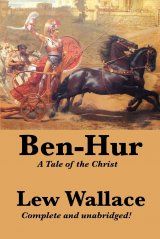Ben-Hur Page #9
Ben-Hur: A Tale of the Christ is a novel by Lew Wallace, published by Harper and Brothers on November 12, 1880, and considered "the most influential Christian book of the nineteenth century". It became a best-selling American novel, surpassing Harriet Beecher Stowe's Uncle Tom's Cabin in sales.
lingered provokingly far up on the battlements and turrets of the great piles about, down from which fell the crooning of pigeons and the whir of the flocks coming and going. As a passing acquaintance with the people of the Holy City, strangers as well as residents, will be necessary to an understanding of some of the pages which follow, it will be well to stop at the gate and pass the scene in review. Better opportunity will not offer to get sight of the populace who will afterwhile go forward in a mood very different from that which now possesses them. The scene is at first one of utter confusion--confusion of action, sounds, colors, and things. It is especially so in the lane and court. The ground there is paved with broad unshaped flags, from which each cry and jar and hoof-stamp arises to swell the medley that rings and roars up between the solid impending walls. A little mixing with the throng, however, a little familiarity with the business going on, will make analysis possible. Here stands a donkey, dozing under panniers full of lentils, beans, onions, and cucumbers, brought fresh from the gardens and terraces of Galilee. When not engaged in serving customers, the master, in a voice which only the initiated can understand, cries his stock. Nothing can be simpler than his costume--sandals, and an unbleached, undyed blanket, crossed over one shoulder and girt round the waist. Near-by, and far more imposing and grotesque, though scarcely as patient as the donkey, kneels a camel, raw-boned, rough, and gray, with long shaggy tufts of fox-colored hair under its throat, neck, and body, and a load of boxes and baskets curiously arranged upon an enormous saddle. The owner is an Egyptian, small, lithe, and of a complexion which has borrowed a good deal from the dust of the roads and the sands of the desert. He wears a faded tarbooshe, a loose gown, sleeveless, unbelted, and dropping from the neck to the knee. His feet are bare. The camel, restless under the load, groans and occasionally shows his teeth; but the man paces indifferently to and fro, holding the driving-strap, and all the time advertising his fruits fresh from the orchards of the Kedron--grapes, dates, figs, apples, and pomegranates. At the corner where the lane opens out into the court, some women sit with their backs against the gray stones of the wall. Their dress is that common to the humbler classes of the country--a linen frock extending the full length of the person, loosely gathered at the waist, and a veil or wimple broad enough, after covering the head, to wrap the shoulders. Their merchandise is contained in a number of earthen jars, such as are still used in the East for bringing water from the wells, and some leathern bottles. Among the jars and bottles, rolling upon the stony floor, regardless of the crowd and cold, often in danger but never hurt, play half a dozen half-naked children, their brown bodies, jetty eyes, and thick black hair attesting the blood of Israel. Sometimes, from under the wimples, the mothers look up, and in the vernacular modestly bespeak their trade: in the bottles "honey of grapes," in the jars "strong drink." Their entreaties are usually lost in the general uproar, and they fare illy against the many competitors: brawny fellows with bare legs, dirty tunics, and long beards, going about with bottles lashed to their backs, and shouting "Honey of wine! Grapes of En-Gedi!" When a customer halts one of them, round comes the bottle, and, upon lifting the thumb from the nozzle, out into the ready cup gushes the deep-red blood of the luscious berry. Scarcely less blatant are the dealers in birds--doves, ducks, and frequently the singing bulbul, or nightingale, most frequently pigeons; and buyers, receiving them from the nets, seldom fail to think of the perilous life of the catchers, bold climbers of the cliffs; now hanging with hand and foot to the face of the crag, now swinging in a basket far down the mountain fissure. Blent with peddlers of jewelry--sharp men cloaked in scarlet and blue, top-heavy under prodigious white turbans, and fully conscious of the power there is in the lustre of a ribbon and the incisive gleam of gold, whether in bracelet or necklace, or in rings for the finger or the nose--and with peddlers of household utensils, and with dealers in wearing-apparel, and with retailers of unguents for anointing the person, and with hucksters of all articles, fanciful as well as of need, hither and thither, tugging at halters and ropes, now screaming, now coaxing, toil the venders of animals--donkeys, horses, calves, sheep, bleating kids, and awkward camels; animals of every kind except the outlawed swine. All these are there; not singly, as described, but many times repeated; not in one place, but everywhere in the market. Turning from this scene in the lane and court, this glance at the sellers and their commodities, the reader has need to give attention, in the next place, to visitors and buyers, for which the best studies will be found outside the gates, where the spectacle is quite as varied and animated; indeed, it may be more so, for there are superadded the effects of tent, booth, and sook, greater space, larger crowd, more unqualified freedom, and the glory of the Eastern sunshine. CHAPTER VII Let us take our stand by the gate, just out of the edge of the currents--one flowing in, the other out--and use our eyes and ears awhile. In good time! Here come two men of a most noteworthy class. "Gods! How cold it is!" says one of them, a powerful figure in armor; on his head a brazen helmet, on his body a shining breastplate and skirts of mail. "How cold it is! Dost thou remember, my Caius, that vault in the Comitium at home which the flamens say is the entrance to the lower world? By Pluto! I could stand there this morning, long enough at least to get warm again!" The party addressed drops the hood of his military cloak, leaving bare his head and face, and replies, with an ironic smile, "The helmets of the legions which conquered Mark Antony were full of Gallic snow; but thou--ah, my poor friend!--thou hast just come from Egypt, bringing its summer in thy blood." And with the last word they disappear through the entrance. Though they had been silent, the armor and the sturdy step would have published them Roman soldiers. From the throng a Jew comes next, meager of frame, round-shouldered, and wearing a coarse brown robe; over his eyes and face, and down his back, hangs a mat of long, uncombed hair. He is alone. Those who meet him laugh, if they do not worse; for he is a Nazarite, one of a despised sect which rejects the books of Moses, devotes itself to abhorred vows, and goes unshorn while the vows endure. As we watch his retiring figure, suddenly there is a commotion in the crowd, a parting quickly to the right and left, with exclamations sharp and decisive. Then the cause comes--a man, Hebrew in feature and dress. The mantle of snow-white linen, held to his head by
Translation
Translate and read this book in other languages:
Select another language:
- - Select -
- 简体中文 (Chinese - Simplified)
- 繁體中文 (Chinese - Traditional)
- Español (Spanish)
- Esperanto (Esperanto)
- 日本語 (Japanese)
- Português (Portuguese)
- Deutsch (German)
- العربية (Arabic)
- Français (French)
- Русский (Russian)
- ಕನ್ನಡ (Kannada)
- 한국어 (Korean)
- עברית (Hebrew)
- Gaeilge (Irish)
- Українська (Ukrainian)
- اردو (Urdu)
- Magyar (Hungarian)
- मानक हिन्दी (Hindi)
- Indonesia (Indonesian)
- Italiano (Italian)
- தமிழ் (Tamil)
- Türkçe (Turkish)
- తెలుగు (Telugu)
- ภาษาไทย (Thai)
- Tiếng Việt (Vietnamese)
- Čeština (Czech)
- Polski (Polish)
- Bahasa Indonesia (Indonesian)
- Românește (Romanian)
- Nederlands (Dutch)
- Ελληνικά (Greek)
- Latinum (Latin)
- Svenska (Swedish)
- Dansk (Danish)
- Suomi (Finnish)
- فارسی (Persian)
- ייִדיש (Yiddish)
- հայերեն (Armenian)
- Norsk (Norwegian)
- English (English)
Citation
Use the citation below to add this book to your bibliography:
Style:MLAChicagoAPA
"Ben-Hur Books." Literature.com. STANDS4 LLC, 2024. Web. 25 Nov. 2024. <https://www.literature.com/book/ben-hur_1675>.




Discuss this Ben-Hur book with the community:
Report Comment
We're doing our best to make sure our content is useful, accurate and safe.
If by any chance you spot an inappropriate comment while navigating through our website please use this form to let us know, and we'll take care of it shortly.
Attachment
You need to be logged in to favorite.
Log In